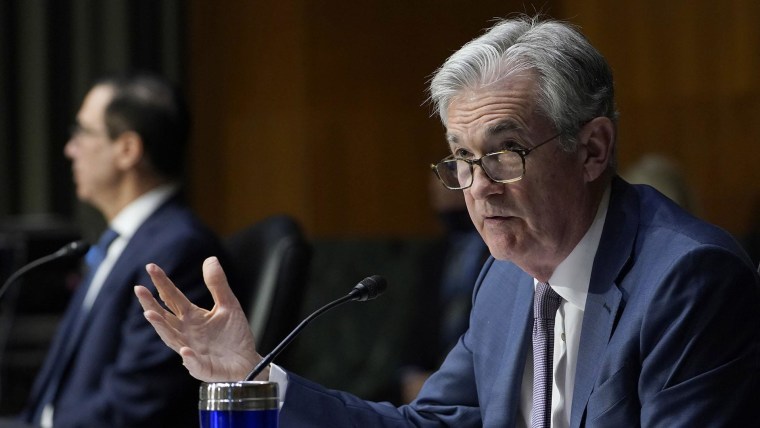Treasury Secretary Steven Mnuchin and Federal Reserve Chair Jerome Powell testified in front of the Senate Banking Committee on Tuesday, as lawmakers asked — in sometimes heated exchanges — why Mnuchin had announced a Dec. 31 expiration date for several CARES Act emergency lending programs.
The Treasury’s announcement triggered a rare public dissent from the Fed, which said the programs were still necessary “as a backstop for our still-strained and vulnerable economy.”
In his prepared remarks on Tuesday, Mnuchin said Congress should use $455 billion in unused CARES Act funds to pass another stimulus bill. That amount is a fraction of the $2.2 trillion stimulus package approved by the House of Representatives back in September. It also is roughly half the size of the aid package rolled out Tuesday by a bipartisan group made up primarily of moderates from both parties.
Luis D. Alvarado, investment strategy analyst at the Wells Fargo Investment Institute, said it wasn’t exactly accurate to characterize the vast majority of those funds as unused, as Mnunchin did. “Markets realized the Fed is having everyone’s back,” he said, adding that the speed and size of the Fed’s intervention prevented further destabilization. “The mere effect that the Fed was going to create these emergency facilities pretty much did it for the markets.”
Banking Committee Chair Sen. Mike Crapo, R-Id., said in his opening remarks that it was appropriate to wind down the programs at the end of the year, and the Republicans on the committee largely used their opportunities for questions to reiterate the Treasury’s assertion that Congress didn’t intend for these programs to extend beyond 2020.
Sen. Pat Toomey, R-Pa., argued that the Fed emergency lending provisions were intended specifically to provide liquidity to markets. “We should not use them to morph into some other purpose,” he said, such as a “supplement or complement to fiscal policy.”
Mnuchin was pressed by Democratic Senators on his assertion that ordering the Fed to return unused emergency program funds to the Treasury was strictly a legal decision, not an economic one, sparring with Sen. Bob Menendez, D-N.J., over the technical basis for his decision to wind down the lending programs.
Sen. Sherrod Brown, D-Oh., the Banking Committee’s top Democrat, pushed back against Crapo’s opening statement and Mnuchin’s prepared remarks, lambasting a “lack of political will” and questioning if the secretary was trying to “sabotage the economy” before the Trump administration turns the reins over to Biden’s team next month.
With the economic recovery slowing, stalling labor market improvement and the prospect of a double wave of Covid-19 infections triggered by holiday gatherings, the central bank argued that even though economic conditions have improved significantly since early spring, having the programs in place gives lenders confidence that markets will remain stable even if conditions worsen.
Dan North, chief economist, North America at Euler Hermes, said this line of reasoning made sense. “If you have it there, you’re less likely to need to use it. That’s a pretty good argument for leaving those things in place,” he said, particularly given economic forecasts of a potentially grim winter for consumers and corporate America alike. “For the moment, I’d really want to reduce uncertainty and leave things in place,” North said.
Although Powell sounded an optimistic tone about next spring and summer, he also spoke of the importance of getting “across the chasm” to the post-pandemic economy, saying that fiscal stimulus gets the “lion’s share” of the credit for stabilizing the economy in the spring and driving a stronger-than-expected recovery.
The next few months will be critical for the nation from a public health as well as an economic perspective. This, at least, was a point of agreement for the two officials. Based on conversations with community bankers, Powell said, “What we are hearing is that there are a lot of small businesses at risk of going out of business this winter.”
In response to remarks from Sen. Tim Scott, R-S.C., about the greater hurdles faced by Black and Hispanic small-business owners, Mnuchin acknowledged that many were fast approaching an inflection point. “These small businesses can’t wait two or three months,” he said.
“My concern is, with the first round of shutdowns we had so many permanent business closures,” North said. Many of the small businesses that managed to make it through the spring won’t make it to the next one without a coordinated policy response, he warned.
“I think we’re going to dig ourselves into a much bigger hole,” North said. “I’m not a big fan of government spending or loose monetary policy, but if there was ever a time for it, it’s now.”
"emergency" - Google News
December 02, 2020 at 03:47AM
https://ift.tt/3odTcyq
Secretary Mnuchin takes heat in Senate hearing for winding down emergency lending program - NBC News
"emergency" - Google News
https://ift.tt/2VVGGYQ
https://ift.tt/3d7MC6X
emergency
Bagikan Berita Ini















0 Response to "Secretary Mnuchin takes heat in Senate hearing for winding down emergency lending program - NBC News"
Post a Comment